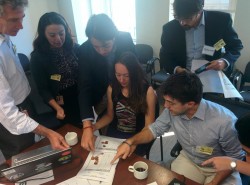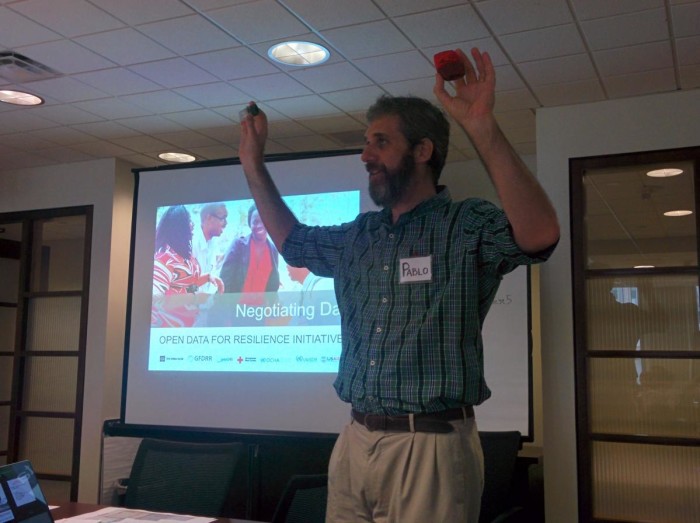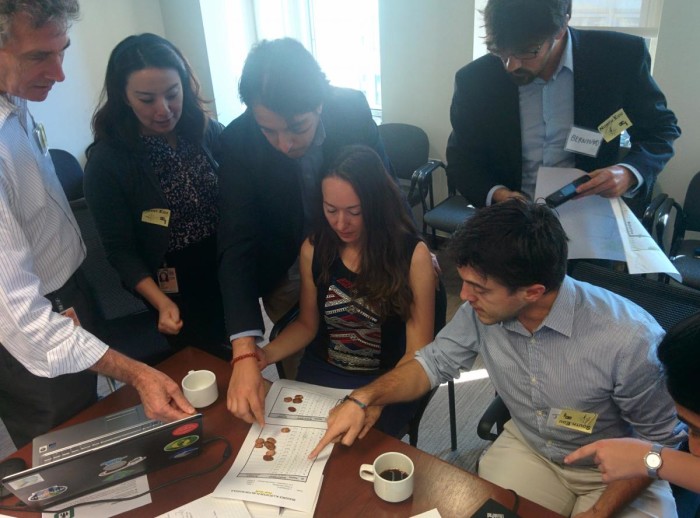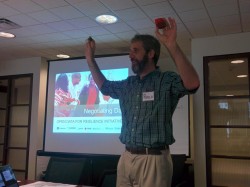Simulating disaster risk management decisions through interactive games
October 31, 2014 5:58 pm Published by Simone Balog Leave a commentGFDRR and the World Bank’s East Asia Pacific (EAP) Disaster Risk Management team recently partnered with noted game designer, Dr. Pablo Suarez, to simulate the decisions that Argentine officials might have made ahead of the 2013 floods in La Plata. For participants from the World Bank and George Washington University, this “serious” game changed the way they see disaster risk management and illustrated the importance of access to open data in driving evidence-based decisions.
This interactive training day was part of the Open Data for Resilience Initiative (OpenDRI), a program organized by the GFDRR Innovation Lab. OpenDRI helps stakeholders better understand their disaster risk through a suite of capacity building and technical assistance activities. These activities include:
- Collecting existing government data about natural hazards and risks;
- Working with communities and local government to collect mapping data;
- Supporting disaster managers to use the geospatial data in open source tools to determine the potential impact of various disasters, such as floods or earthquakes
OpenDRI uses a suite of complementary open source tools that supports each of the activities. These include GeoNode, a data repository for storing geospatial data;OpenStreetMap, an editable, open map to collect new geospatial data; and InaSAFE, a disaster scenario impact tool that helps visualize risk.
Participants actively engaged with these open-source toolsets before applying those new skills to decisions around disaster risk management. They worked on a common challenge: how to ensure that resources are spent wisely. They had to find a balance between funding the retrofitting of the schools that were most vulnerable to flooding versus outfitting the other schools with computers and food/water stockpiles or some combination of both.
The training structure did not follow the ‘death by PowerPoint’ format; it was designed in the form of a game where two teams of nine people competed to build the most optimal allocation of scarce resources for schools at risk of flooding in the city of La Plata using primarily InaSAFE. Toggling between theory and practice highlighted the importance of free and open-source geospatial software in decision-making, while exposing the need for open data to drive shared analysis and negotiation over resource allocations.
 In expanding the work of bringing the open data movement to bear on resilience challenges, GFDRR will be offering additional training sessions in OpenDRI in November. For more information, contact Vivien Deparday, vdeparday@worldbank.org
In expanding the work of bringing the open data movement to bear on resilience challenges, GFDRR will be offering additional training sessions in OpenDRI in November. For more information, contact Vivien Deparday, vdeparday@worldbank.org
Publication Launch: Planning an Open Cities Project
October 27, 2014 5:35 pm Published by Simone Balog Leave a commentTo manage disaster risk in expanding urban areas, a deep understanding of the built environment is essential. The Open Cities Project, part of the Open Data for Resilience Initiative (OpenDRI), has worked in three cities in South Asia to increase this understanding through community mapping and crowdsourcing activities. Now, the Open Cities team has shared their experiences and processes for creating a community mapping project in a newly released publication. This guide, Planning an Open Cities Project, walks the reader through project design and implementation, highlighting common challenges and lessons learned in community mapping.
For more information visit: http://www.opencitiesproject.org/
Simulating disaster risk management decisions through interactive games
October 13, 2014 10:17 pm Published by Simone Balog Leave a commentGFDRR and the World Bank’s East Asia Pacific (EAP) Disaster Risk Management team recently partnered with noted game designer, Dr. Pablo Suarez, to simulate the decisions that Argentine officials might have made ahead of the 2013 floods in La Plata. For participants from the World Bank and George Washington University, this “serious” game changed the way they see disaster risk management and illustrated the importance of access to open data in driving evidence-based decisions.
This interactive training day was part of the Open Data for Resilience Initiative (OpenDRI), a program organized by the GFDRR Innovation Lab. OpenDRI helps stakeholders better understand their disaster risk through a suite of capacity building and technical assistance activities. These activities include:
- Collecting existing government data about natural hazards and risks;
- Working with communities and local government to collect mapping data;
- Supporting disaster managers to use the geospatial data in open source tools to determine the potential impact of various disasters, such as floods or earthquakes

OpenDRI uses a suite of complementary open source tools that supports each of the activities. These include GeoNode, a data repository for storing geospatial data; OpenStreetMap, an editable, open map to collect new geospatial data; and InaSAFE, a disaster scenario impact tool that helps visualize risk.
Participants actively engaged with these open-source toolsets before applying those new skills to decisions around disaster risk management. They worked on a common challenge: how to ensure that resources are spent wisely. They had to find a balance between funding the retrofitting of the schools that were most vulnerable to flooding versus outfitting the other schools with computers and food/water stockpiles or some combination of both.
The training structure did not follow the ‘death by PowerPoint’ format; it was designed in the form of a game where two teams of nine people competed to build the most optimal allocation of scarce resources for schools at risk of flooding in the city of La Plata using primarily InaSAFE. Toggling between theory and practice highlighted the importance of free and open-source geospatial software in decision-making, while exposing the need for open data to drive shared analysis and negotiation over resource allocations.

In expanding the work of bringing the open data movement to bear on resilience challenges, GFDRR will be offering additional training sessions in OpenDRI in November. For more information, contact Vivien Deparday, vdeparday@worldbank.org
Waiting for the Big One: the Continued Earthquake Risk of Port-au-Prince, Haiti
October 5, 2014 10:32 pm Published by Simone Balog Leave a commentBetter Understanding Disaster Risk: A New Dataset Is Set to Make a Difference
September 24, 2014 10:14 pm Published by Simone Balog Leave a commentPakistan Flood 2014- Lesson Identified Never Learned
September 10, 2014 10:13 pm Published by Simone Balog Leave a commentInaSAFE Video
September 4, 2014 2:47 pm Published by Simone Balog Leave a commentPresent Status of the Drainage Network of Dhaka City: In Reference to Recent Flooding Conditions
August 19, 2014 10:12 pm Published by Simone Balog Leave a commentCall for Papers: Scoping Report for an Open Risk Data and Modelling Platform
August 17, 2014 6:34 pm Published by Simone Balog Leave a commentSCOPING REPORT: GUIDELINE FOR SUBMISSION
The UK Department for International Development (DFID) and the Global Facility for Disaster Reduction and Recovery (GFDRR) are developing a Scoping Report that seeks to explore the need for a new open risk data and modelling platform to improve the understanding of disaster risk in developing countries. Through the exploration of this question, the needs and scope of a risk platform will be assessed, providing a series of recommendations on possible options. Based on the outcomes of the report one or two pilot studies will be developed.
Please see the concept note for further information on the Report.
We are opening a call for papers to explore the following topics:
(1) What are the user needs?
(2) Status of risk data/modelling platforms and the gaps
(3) Necessary Foundations 1: Data
(4) Necessary Foundations 2: Capacity
(5) Necessary Foundations 3: Communicating risk and building demand
(6) Priorities for the short and medium-term
If you are interested in submitting a paper, please articulate which key question you are answering and follow the guidelines below. You may contact the team for further guidance if required.
Please note: your paper will be published as a consultation paper on the website and inform the development of the Scoping Report.
FORMAT
- Title: should not be more than 90 characters
- Authors: should be listed beneath the title on the opening page of the article
- Abstract: include in bullet points the top 5 messages of your paper
- Main text:
- Start with a brief introduction describing the paper’s significance. Technical terms should be defined.
- Challenge(s)
- Solution/recommendation(s)
- References: any relevant citations should be marked as end notes and not within the text
GUIDELINES
- First draft Deadline: August 1, 2015. Please email your paper by August 1 to Emma Phillips (ephillips@worldbank.org) and Amal Ali (amalali@worldbankgroup.org)
- Total word limit: 1,000 – 2,000 words
- Images and illustrations: Please send images or graphics separately and in high resolution



